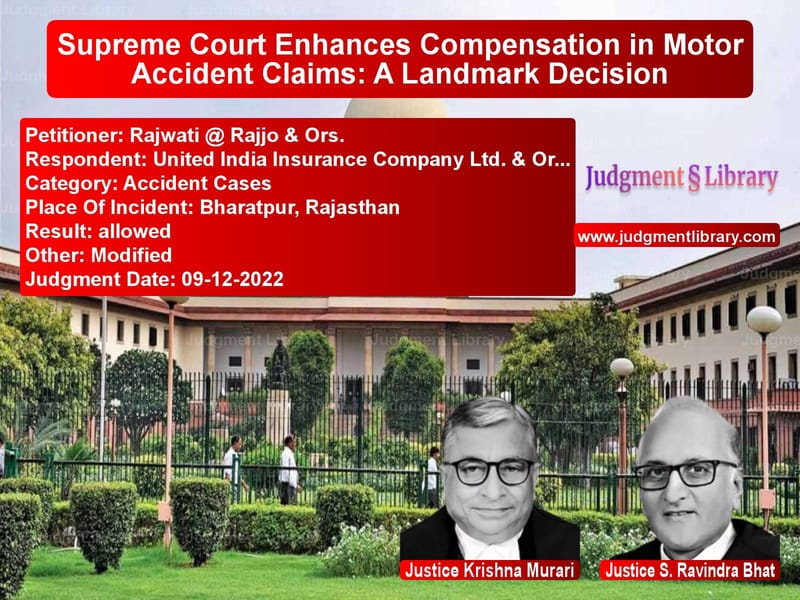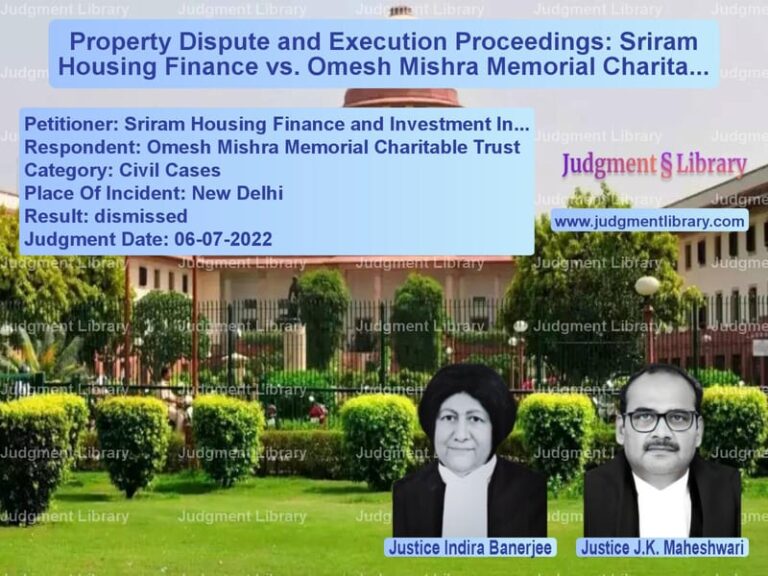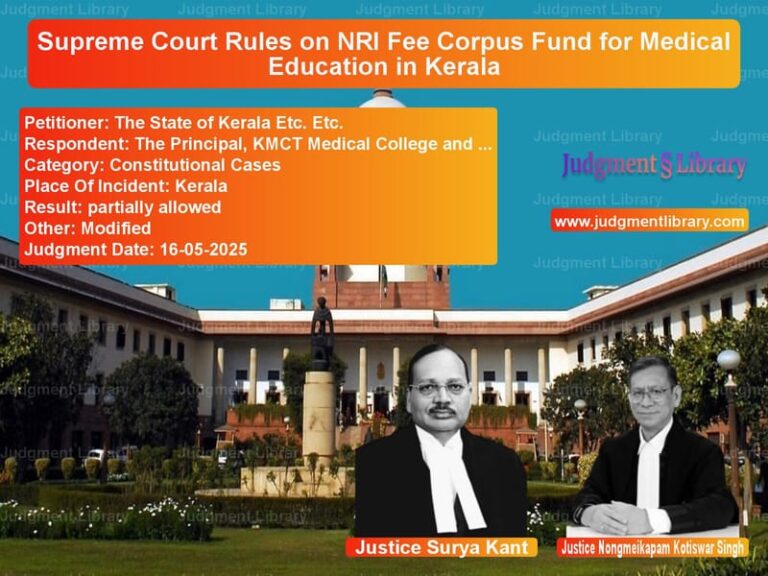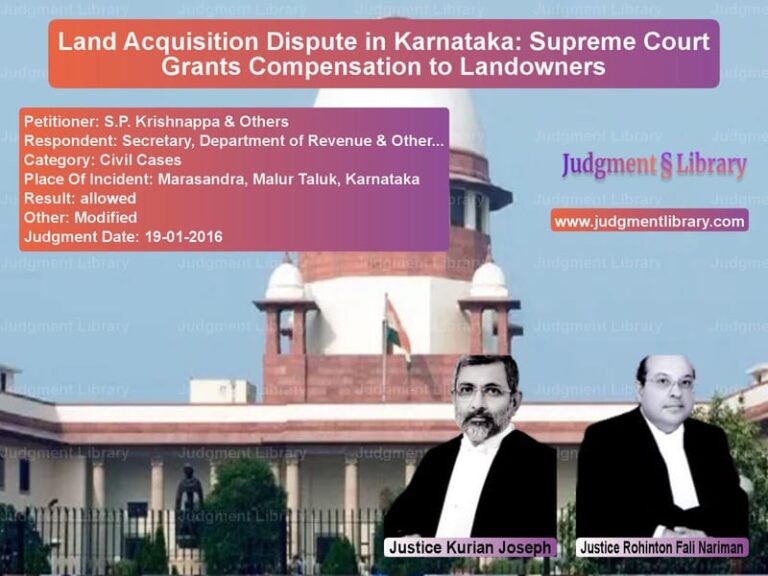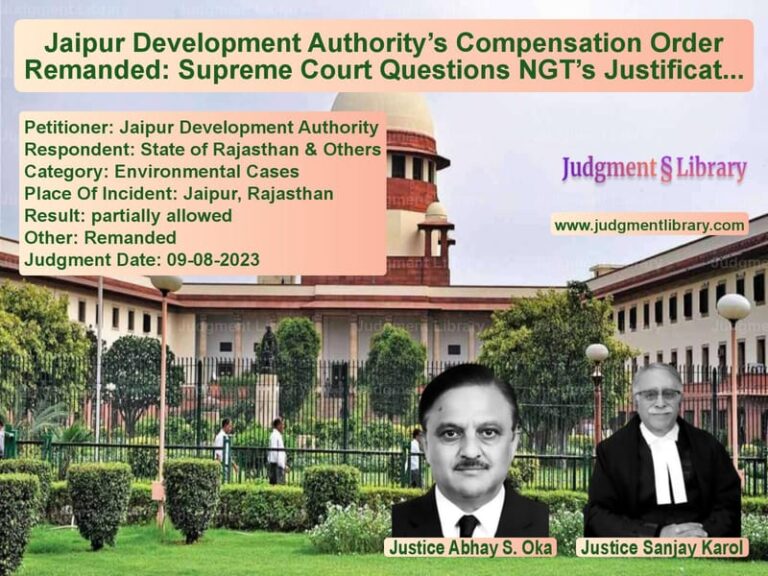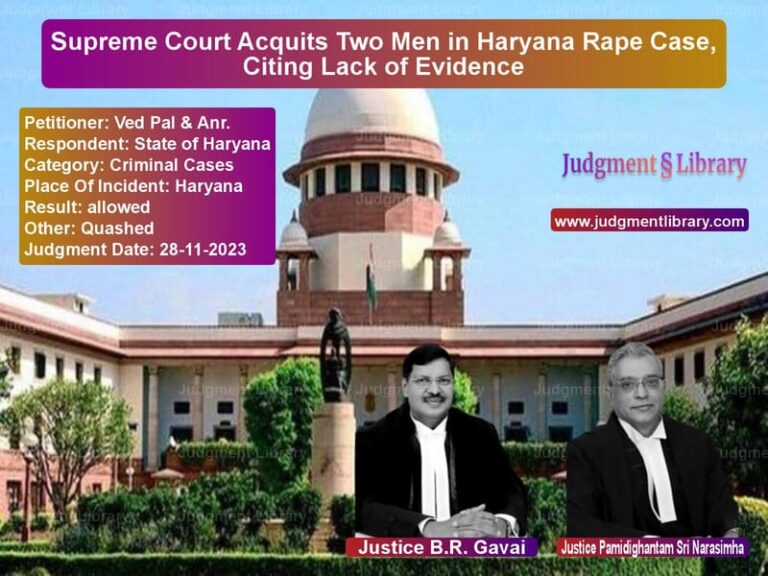Supreme Court Enhances Compensation in Motor Accident Claims: A Landmark Decision
The case of Rajwati @ Rajjo & Ors. vs. United India Insurance Co. Ltd. & Ors. is a significant ruling by the Supreme Court of India concerning compensation in motor accident claims under the Motor Vehicles Act, 1988. This judgment addresses key legal aspects related to the assessment of compensation, the validity of salary documents, the application of future prospects, and the role of the High Court in re-evaluating the compensation awarded by the Motor Accident Claims Tribunal (MACT). The Supreme Court’s decision in this case serves as a crucial precedent for similar claims and provides clarity on the standards for awarding just and fair compensation.
The case arises from a tragic road accident that occurred on October 29, 2013, resulting in the death of two individuals, Ghasita Ram and Kanti Lal. The deceased were employed as drivers and were returning home from work when their motorcycle was hit by a truck driven in a rash and negligent manner. The accident led to their immediate demise, leaving behind their dependents, who subsequently filed compensation claims under the Motor Vehicles Act.
Background of the Case
The legal heirs of the deceased, including their wives and children, filed separate claim petitions under Section 166 of the Motor Vehicles Act, 1988, seeking compensation from the insurance company. The MACT awarded compensation based on salary documents submitted by the claimants, assessing the monthly income of the deceased at Rs.11,225. The MACT also applied a multiplier based on the age of the deceased and added future prospects in accordance with established legal principles.
However, the insurance company challenged this award before the Rajasthan High Court, arguing that the salary documents were not adequately proven and that the claimants had failed to produce the issuing authority as a witness. The High Court accepted this argument and significantly reduced the assessed monthly income of the deceased to Rs.4,836, applying minimum wages as the basis for calculation. This led to a drastic reduction in the overall compensation.
Arguments by the Appellants
Represented by Advocate Anuj Bhandari, the appellants (legal heirs of the deceased) presented the following arguments before the Supreme Court:
- The High Court erred in rejecting the salary certificate and pay slip submitted as evidence, merely because the issuing authority was not examined as a witness.
- The MACT had rightly relied on these documents, which were corroborated by the testimony of the deceased’s wife and co-workers.
- The standard of proof in motor accident claims is based on the preponderance of probability and not on strict evidentiary rules applicable in criminal trials.
- The reduction in income assessment by the High Court was arbitrary and unjust, leading to unfair deprivation of rightful compensation.
- The compensation under the ‘loss of consortium’ head was inadequate and should be enhanced in line with recent Supreme Court rulings.
Arguments by the Respondents
The insurance company, represented by Advocate Varinder Kumar Sharma, countered these claims with the following arguments:
- The salary documents were unreliable as the issuing authority was not examined.
- In the absence of strong documentary proof, the High Court rightly applied minimum wages as the basis for income assessment.
- The compensation awarded by the High Court was fair and reasonable, and there was no justification for enhancement.
Supreme Court’s Observations
After a detailed analysis of the evidence and legal principles, the Supreme Court made the following key observations:
- The Motor Vehicles Act is a beneficial piece of legislation, aimed at providing just compensation to victims of road accidents.
- Strict rules of evidence applicable in criminal trials do not apply to motor accident claims, where a preponderance of probability is sufficient.
- The salary certificate and pay slip were valid pieces of evidence and should not have been disregarded solely because the issuing authority was not examined.
- The High Court’s reliance on minimum wages was erroneous, as there was credible evidence to establish a higher income.
- Future prospects should be factored in as per the principles laid down in Pranay Sethi, with a 30% increase applied to the assessed income.
Supreme Court’s Verdict
The Supreme Court restored and enhanced the compensation, applying the correct income assessment and future prospects. The final compensation awarded was as follows:
| Head | Amount (Rs.) |
|---|---|
| Loss of dependency | 18,38,655 |
| Loss of consortium | 2,20,000 |
| Loss of estate | 20,000 |
| Funeral expenses | 20,000 |
| Total | 20,98,655 |
The Court also increased the interest rate on the awarded amount to 9% per annum from the date of filing until realization.
Legal Precedents Cited
The Supreme Court referred to several landmark judgments, including:
- Pranay Sethi (2017) 16 SCC 680: Establishing the principles for calculating future prospects in compensation claims.
- Sarla Verma (2009) 6 SCC 121: Providing guidelines on the application of multipliers based on the age of the deceased.
- Satinder Kaur @ Satwinder Kaur (2021) 11 SCC 780: Specifying compensation amounts for loss of consortium for dependents.
- Sunita vs. Rajasthan State Road Transport Corporation (2020) 13 SCC 486: Emphasizing the standard of proof in motor accident claims.
Conclusion
This judgment serves as an important precedent in ensuring that compensation awarded in motor accident cases is just, fair, and in line with legal principles. The Supreme Court’s intervention highlights the importance of proper assessment of income, the role of corroborative evidence, and the necessity of applying future prospects. The ruling also reinforces the principle that courts must ensure that accident victims and their dependents receive adequate compensation without arbitrary reductions.
Petitioner Name: Rajwati @ Rajjo & Ors..Respondent Name: United India Insurance Company Ltd. & Ors..Judgment By: Justice Krishna Murari, Justice S. Ravindra Bhat.Place Of Incident: Bharatpur, Rajasthan.Judgment Date: 09-12-2022.
Don’t miss out on the full details! Download the complete judgment in PDF format below and gain valuable insights instantly!
Download Judgment: rajwati-@-rajjo-&-or-vs-united-india-insuran-supreme-court-of-india-judgment-dated-09-12-2022.pdf
Directly Download Judgment: Directly download this Judgment
See all petitions in Road Accident Cases
See all petitions in Compensation Disputes
See all petitions in Negligence Claims
See all petitions in Judgment by Krishna Murari
See all petitions in Judgment by S Ravindra Bhat
See all petitions in allowed
See all petitions in Modified
See all petitions in supreme court of India judgments December 2022
See all petitions in 2022 judgments
See all posts in Accident Cases Category
See all allowed petitions in Accident Cases Category
See all Dismissed petitions in Accident Cases Category
See all partially allowed petitions in Accident Cases Category

